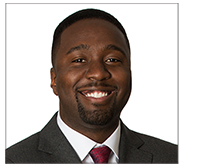Blog
Class Action Insider Spotlight on Partner Sean Suber
Blog
May 31, 2024
 This week, we proudly present Sean Suber, who is a rising partner and long-time member of Winston’s class action group. Sean focuses his practice on complex commercial litigation, trials, and appeals, with considerable experience handling consumer class actions. His work has been recognized by a myriad of publications, including for class action defense by Legal 500 US, Lawdragon, and Best Lawyers: Ones to Watch® in America.
This week, we proudly present Sean Suber, who is a rising partner and long-time member of Winston’s class action group. Sean focuses his practice on complex commercial litigation, trials, and appeals, with considerable experience handling consumer class actions. His work has been recognized by a myriad of publications, including for class action defense by Legal 500 US, Lawdragon, and Best Lawyers: Ones to Watch® in America.
What trends do you anticipate in class action litigation as we move further into 2024?
I primarily defend clients from the consumer products and food and beverage industry in consumer class actions. As 2024 progresses, I anticipate we will increasingly apply class action defense strategies to help defeat a rising number of individual product liability and mass and toxic tort cases in multi-district litigation. Over the years, companies have employed many successful defenses to defeat class actions by highlighting the lack of uniform harm and individualized differences that would make a case unsuitable for class treatment. Given this, a few entrepreneurial lawyers have tried to flip the script by bringing thousands of individual product liability cases premised on generalized theories of a risk of harm that stem from what they claim to be uniform misrepresentations, omissions, and failures to warn. This means that whenever there are reports of a recall, or “newly discovered” or “recently uncovered” studies, articles, or evidence to support a generalized and opaque risk of harm related to a product or service (think heavy metals, cancer, and the like), companies should not only expect potential class action litigation to result but also an increasing amount of individual product liability claims to arise as well. These claims would come from consumers who claim that they did, in fact, suffer the “newly discovered” or “recently uncovered” general harm and would not have done so but for the alleged fraudulent practices of a company.
To be sure, these claims are not new; but the potential liability—not to mention the litigation cost—from the ever-growing amount of claims in MDLs cannot be ignored. It is for that reason, that our firm has already been used increasingly in product liability matters to employ the strategies we have used in class actions and in MDLs, along with complex overlapping proceedings across the country. The strategies and experience that we have developed for class actions are helpful to the defense of product and consumer litigation, and vice versa. I see us continuously adding value for our clients in that regard in 2024 and beyond.
Is there another practice group initiative you’ve been excited about?
I am excited about Winston’s renewed focus on ensuring that our clients in the consumer products industry benefit from the cross-collaboration between our litigators and transactional attorneys. Our firm has made a concerted effort not just to service our consumer products clients when they are facing a class action, but also to help them with all their needs from investigations to transactional needs as well. For example, in the last year, our firm made major leaps in the rankings for law firms advising on M&A in the consumer sector in the first quarter of the year. In the first quarter of 2024, it was recently reported that Winston was ranked 3rd in terms of deal value and 4th in term of deal volume. This is a testament to the hard work of our group, and I am excited about initiatives we are discussing to make sure we are providing resources and insights to address all the issues facing our clients and potential clients in the consumer products industry, including as it relates to class actions.
How has Winston’s diversity initiatives impacted your practice in a positive way?
I am a firm believer in the benefits of diversity, equity, and inclusion, and it has positively impacted my practice and the firm. When I was an associate, Winston supported my involvement as a fellow in the Chicago Committee on Minorities in Large Law Firms’ Pathway to Partnership program. It was through that program that I secured my first client, which I believe was invaluable to me making partner. As a partner, I have been able to make and deepen client connections by building relationships through my involvement and attendance in different diversity-oriented programs and conferences.
When working for our clients in class actions, our work requires us to have a diverse and thoughtful team to succeed because we must rely on a variety of different–and new–perspectives to determine the best arguments and strategies for success. Diversity is not a zero-sum game. Building a diverse, open, and inclusive firm is not only the right thing to do – it also yields measurable benefits that set us apart.
This entry has been created for information and planning purposes. It is not intended to be, nor should it be substituted for, legal advice, which turns on specific facts.

